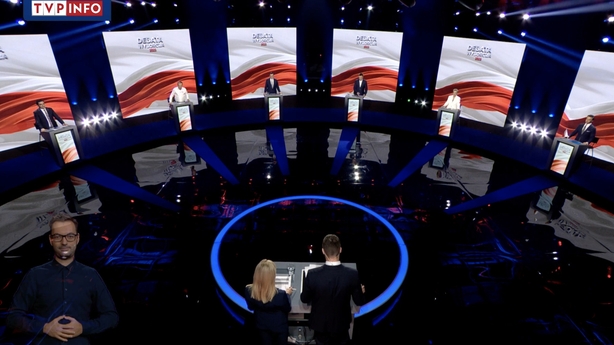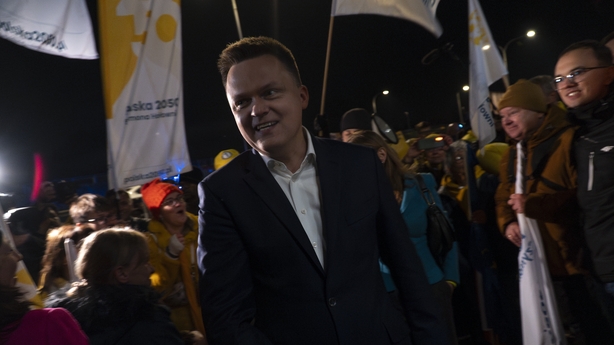Leaders from Poland's six main parties went head-to-head last night in a final televised debate before next Sunday’s parliamentary election.
The debate was aired by public broadcaster TVP, which tows a strong pro-government editorial line and has been criticised by opposition parties during the campaign for its lack of balance.
Last night’s debate was the only one to feature both Prime Minister Mateusz Morawiecki and Donald Tusk, leader of the main centrist opposition, in the same line-up.
The ruling nationalist-populist Law and Justice party declined an invitation last month to participate in independent broadcaster TVN’s election debate, claiming that the station was running a "de facto campaign" for Mr Tusk’s opposition.
Watching Mr Tusk appear live on TVP was something of a novelty for viewers. It was his first appearance on public television in eight years.
TVP1’s main evening news bulletins regularly criticises Mr Tusk’s opposition bloc, Civic Coalition, and promotes the policies of Law and Justice.
"Public media has become a propaganda outlet for the ruling party and I think that anybody who claims differently isn’t serious," Andrzej Bobinski, editor-in-chief of Polityka Insight told RTÉ News.

In last night's debate, party leaders answered questions on the main election topics, from immigration and national security, to the age of retirement and unemployment.
The format gave party representatives 60 seconds to answer each question.
Mr Morawiecki dedicated almost each answer to criticising Mr Tusk’s past record as prime minister from 2007 to 2014, which became a repetitive tactic.
At one stage, he labelled Mr Tusk the "premier of poverty and unemployment", a reference to the late 2000s when many young Poles emigrated to western EU states for better paid jobs.
Mr Tusk got out of the blocks slowly, criticising TVP's coverage at the expense of answering a question on immigration policy within the allotted time frame.
The former prime minister looked tired on stage, perhaps the result of endless weeks of campaigning across the country.
Mr Tusk, who has moved his own party more to the centre on economic policy in recent months, said that too many Poles were working in low-paid jobs.
Mr Morawiecki also lambasted the parties that could offer Mr Tusk a broader coalition after the election.
He criticised the Left's Joanna Scheuring-Wielgus for questioning the legacy of Pope John Paul II, and Szymon Holownia, leader of the centre-right Third Way, for opposing the government’s plan to increase child benefit payments.
However, opposition party leaders also lined up to criticise Law and Justice’s eight years in government.
Even Krzysztof Bosak, the co-leader of the far-right Confederation party, railed against Law and Justice’s record on the economy and its handling of inflation, which remained around 16% for a year until last March.
It was a sign that the ruling party may have difficulty finding willing coalition partners.
Current polling indicates that Law and Justice is likely to remain Poland’s largest party, but will fall short of an outright majority - it needs more than 230 seats in the country’s 460-seat parliament.

Mr Holownia, leader of the centre-right Third Way, stood out as the evening’s most competent speaker.
He listed statistics with ease and criticised long waiting times in the public health system, which may have hit a nerve with TVP1’s predominantly older audience.
However, the latest IBRiS poll from yesterday showed Third Way at 7.6%, just under the 8% threshold required nationally for coalitions to take up their seats in parliament.
Failure for Third Way to make the threshold would scupper Mr Tusk’s chances of forming a broader coalition government after Sunday’s vote.
The Left’s speaker, Joanna Scheuring-Wielgus, told viewers that a vote for her party would allow women to decide issues for themselves - a reference to the party’s pro-choice stance on abortion.
Just over 8% of voters remain undecided, according to the same IBRiS poll.
Immediately following the debate, TVP1's news bulletin featured stories which claimed that Poland was poorer during the time of Mr Tusk’s Civic Platform government, and broadcast a live speech by Mr Morawiecki to Law and Justice supporters.







